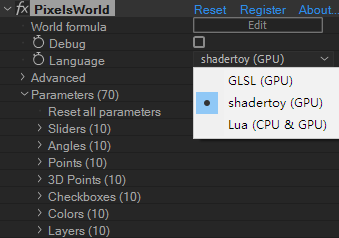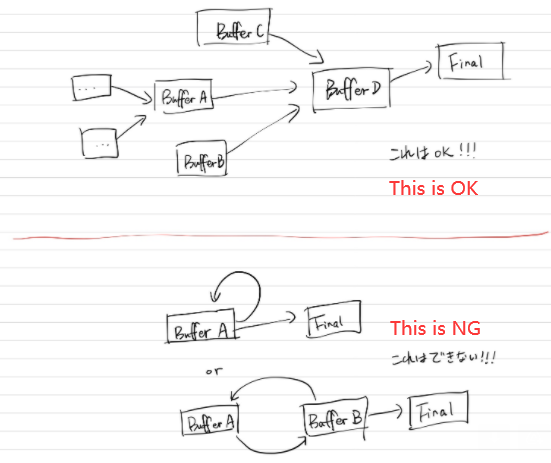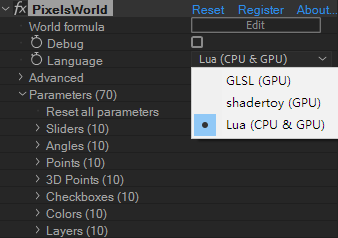ShaderToy Sanctuary Template
Usage
In this mode, you can directly use code from shadertoy.com.

Note
Not all code from shadertoy.com can perfectly run in PixelsWorld (e.g., code with audio input, requiring VR support, and containing loop buffer references).

Details
If you would like to use custom parameter panels in shadertoy mode, simply add the _PixelsWorld_ prefix to all variables in GLSL mode to enable them.
For instance,
slider[0]in GLSL mode will become_PixelsWorld_slider[0].
Refer to here to understand the definitions of all global variables.
Of course, in shadertoy mode, it's not recommended to define variables with the _PixelsWorld_ prefix on your own.
Using Buffers
Shadertoy inherently offers 4 buffers, and you can also implement buffers in PixelsWorld.
Non-Cyclic Buffers

If the effects you are using do not involve cyclic calls between Buffers (as shown in the lower half of the previous diagram), then the buffers in your effect are non-cyclic. You can call them using the code template below (note: you need to switch to Lua mode).
For instance, for the code from: https://www.shadertoy.com/view/4dVGRW:
- This effect uses
BufferA, so the code setsAtotruein the fourth line below. BufferAis ultimately bound toiChannel0on theMainimage, so the code setsAtoMainto0on line 15 below.- Next, copy the
BufferAandMaincodes into their respective variables. - Finally, to ensure correct results, set the plugin panel's
Advanced->Internal texture formattoFloating point 32 bit x RGBA (HDR)to prevent PixelsWorld from flattening the Alpha channel internally. - Make sure you are in Lua rendering mode.
rotatingCubes.lua
version3()
enable = {
A=true,
B=false,
C=false,
D=false,
-- '-1': disable
-- '0~3': which iChannel to set
AtoB = -1,
AtoC = -1,
AtoD = -1,
AtoMain = 0,
BtoC = -1,
BtoD = -1,
BtoMain = -1,
CtoD = -1,
CtoMain = -1,
DtoMain = -1,
}
mainCode = [==[
// Paste the main code here.
mat3 calcLookAtMatrix(vec3 origin, vec3 target, float roll) {
vec3 rr = vec3(sin(roll), cos(roll), 0.0);
vec3 ww = normalize(target - origin);
vec3 uu = normalize(cross(ww, rr));
vec3 vv = normalize(cross(uu, ww));
return mat3(uu, vv, ww);
}
vec3 getRay(vec3 origin, vec3 target, vec2 screenPos, float lensLength) {
mat3 camMat = calcLookAtMatrix(origin, target, 0.0);
return normalize(camMat * vec3(screenPos, lensLength));
}
vec2 squareFrame(vec2 screenSize, vec2 coord) {
vec2 position = 2.0 * (coord.xy / screenSize.xy) - 1.0;
position.x *= screenSize.x / screenSize.y;
return position;
}
vec2 getDeltas(sampler2D buffer, vec2 uv) {
vec2 pixel = vec2(1. / iResolution.xy);
vec3 pole = vec3(-1, 0, +1);
float dpos = 0.0;
float dnor = 0.0;
vec4 s0 = texture(iChannel0, uv + pixel.xy * pole.xx); // x1, y1
vec4 s1 = texture(iChannel0, uv + pixel.xy * pole.yx); // x2, y1
vec4 s2 = texture(iChannel0, uv + pixel.xy * pole.zx); // x3, y1
vec4 s3 = texture(iChannel0, uv + pixel.xy * pole.xy); // x1, y2
vec4 s4 = texture(iChannel0, uv + pixel.xy * pole.yy); // x2, y2
vec4 s5 = texture(iChannel0, uv + pixel.xy * pole.zy); // x3, y2
vec4 s6 = texture(iChannel0, uv + pixel.xy * pole.xz); // x1, y3
vec4 s7 = texture(iChannel0, uv + pixel.xy * pole.yz); // x2, y3
vec4 s8 = texture(iChannel0, uv + pixel.xy * pole.zz); // x3, y3
dpos = (
abs(s1.a - s7.a) +
abs(s5.a - s3.a) +
abs(s0.a - s8.a) +
abs(s2.a - s6.a)
) * 0.5;
dpos += (
max(0.0, 1.0 - dot(s1.rgb, s7.rgb)) +
max(0.0, 1.0 - dot(s5.rgb, s3.rgb)) +
max(0.0, 1.0 - dot(s0.rgb, s8.rgb)) +
max(0.0, 1.0 - dot(s2.rgb, s6.rgb))
);
dpos = pow(max(dpos - 0.5, 0.0), 5.0);
return vec2(dpos, dnor);
}
void mainImage(out vec4 fragColor, in vec2 fragCoord) {
vec3 ro = vec3(sin(iTime * 0.2), 1.5, cos(iTime * 0.2)) * 5.;
vec3 ta = vec3(0, 0, 0);
vec3 rd = getRay(ro, ta, squareFrame(iResolution.xy, fragCoord.xy), 2.0);
vec2 uv = fragCoord.xy / iResolution.xy;
vec4 buf = texture(iChannel0, fragCoord.xy / iResolution.xy);
float t = buf.a;
vec3 nor = buf.rgb;
vec3 pos = ro + rd * t;
vec3 col = vec3(0.5, 0.8, 1);
vec2 deltas = getDeltas(iChannel0, uv);
if (t > -0.5) {
col = vec3(1.0);
col *= max(0.3, 0.3 + dot(nor, normalize(vec3(0, 1, 0.5))));
col *= vec3(1, 0.8, 0.35);
}
col.r = smoothstep(0.1, 1.0, col.r);
col.g = smoothstep(0.1, 1.1, col.g);
col.b = smoothstep(-0.1, 1.0, col.b);
col = pow(col, vec3(1.1));
col -= deltas.x - deltas.y;
fragColor = vec4(col, 1);
}
]==];
commonCode = [==[
// Paste the common code here
]==]
bufferACode = [==[
// Paste the Buffer A code here
float sdBox( vec3 p, vec3 b ) {
vec3 d = abs(p) - b;
return min(max(d.x,max(d.y,d.z)),0.0) +
length(max(d,0.0));
}
vec2 mirror(vec2 p, float v) {
float hv = v * 0.5;
vec2 fl = mod(floor(p / v + 0.5), 2.0) * 2.0 - 1.0;
vec2 mp = mod(p + hv, v) - hv;
return fl * mp;
}
vec2 rotate2D(vec2 p, float a) {
return p * mat2(cos(a), -sin(a), sin(a), cos(a));
}
float map(vec3 p) {
float r = iMouse.z > 0.0 ? iMouse.x / 100.0 : iTime * 0.9;
p.xz = mirror(p.xz, 4.);
p.xz = rotate2D(p.xz, r);
float d = sdBox(p, vec3(1));
d = min(d, sdBox(p, vec3(0.1, 0.1, 3)));
d = min(d, sdBox(p, vec3(3, 0.1, 0.1)));
return d;
}
mat3 calcLookAtMatrix(vec3 origin, vec3 target, float roll) {
vec3 rr = vec3(sin(roll), cos(roll), 0.0);
vec3 ww = normalize(target - origin);
vec3 uu = normalize(cross(ww, rr));
vec3 vv = normalize(cross(uu, ww));
return mat3(uu, vv, ww);
}
vec3 getRay(vec3 origin, vec3 target, vec2 screenPos, float lensLength) {
mat3 camMat = calcLookAtMatrix(origin, target, 0.0);
return normalize(camMat * vec3(screenPos, lensLength));
}
float calcRayIntersection(vec3 rayOrigin, vec3 rayDir, float maxd, float precis) {
float latest = precis * 2.0;
float dist = +0.0;
float type = -1.0;
float res = -1.0;
for (int i = 0; i < 30; i++) {
if (latest < precis || dist > maxd) break;
float result = map(rayOrigin + rayDir * dist);
latest = result;
dist += latest;
}
if (dist < maxd) {
res = dist;
}
return res;
}
vec2 squareFrame(vec2 screenSize, vec2 coord) {
vec2 position = 2.0 * (coord.xy / screenSize.xy) - 1.0;
position.x *= screenSize.x / screenSize.y;
return position;
}
vec3 calcNormal(vec3 pos, float eps) {
const vec3 v1 = vec3( 1.0,-1.0,-1.0);
const vec3 v2 = vec3(-1.0,-1.0, 1.0);
const vec3 v3 = vec3(-1.0, 1.0,-1.0);
const vec3 v4 = vec3( 1.0, 1.0, 1.0);
return normalize( v1 * map( pos + v1*eps ) +
v2 * map( pos + v2*eps ) +
v3 * map( pos + v3*eps ) +
v4 * map( pos + v4*eps ) );
}
vec3 calcNormal(vec3 pos) {
return calcNormal(pos, 0.002);
}
void mainImage(out vec4 fragColor, in vec2 fragCoord) {
vec2 uv = squareFrame(iResolution.xy, fragCoord.xy);
vec3 ro = vec3(sin(iTime * 0.2), 1.5, cos(iTime * 0.2)) * 5.;
vec3 ta = vec3(0, 0, 0);
vec3 rd = getRay(ro, ta, uv, 2.0);
float t = calcRayIntersection(ro, rd, 20.0, 0.001);
vec3 pos = ro + rd * t;
vec3 nor = calcNormal(pos);
fragColor = vec4(nor, t);
}
]==];
bufferBCode = [==[
// Paste the Buffer B code here
]==];
bufferCCode = [==[
// Paste the Buffer C code here
]==];
bufferDCode = [==[
// Paste the Buffer D code here
]==];
-- == WARNING WARNING WARNING WARNING WARNING == --
-- == Code below this line should not be modified. == --
-- Code By ZzStarSound
-- This preset code should only be used inside PixelsWorld.
-- Any abusing of the code is not permitted.
swapTexDet = function(sch,tch)
if sch == nil or tch == nil then return end
if sch >= 0 and sch <= 3 then
swapTex(sch,tch)
end
end
if enable.A then
texA = newTex(width,height)
shadertoy(commonCode .. bufferACode)
swapTex(texA,OUTPUT)
end
if enable.B then
texB = newTex(width,height)
swapTexDet(enable.AtoB,texA)
shadertoy(commonCode .. bufferBCode)
swapTexDet(enable.AtoB,texA)
swapTex(texB,OUTPUT)
end
if enable.C then
texC = newTex(width,height)
swapTexDet(enable.AtoC,texA)
swapTexDet(enable.BtoC,texB)
shadertoy(commonCode .. bufferCCode)
swapTexDet(enable.AtoC,texA)
swapTexDet(enable.BtoC,texB)
swapTex(texC,OUTPUT)
end
if enable.D then
texD = newTex(width,height)
swapTexDet(enable.AtoD,texA)
swapTexDet(enable.BtoD,texB)
swapTexDet(enable.CtoD,texC)
shadertoy(commonCode .. bufferDCode)
swapTexDet(enable.AtoD,texA)
swapTexDet(enable.BtoD,texB)
swapTexDet(enable.CtoD,texC)
swapTex(texD,OUTPUT)
end
swapTexDet(enable.AtoMain,texA)
swapTexDet(enable.BtoMain,texB)
swapTexDet(enable.CtoMain,texC)
swapTexDet(enable.DtoMain,texD)
shadertoy(commonCode .. mainCode)
swapTexDet(enable.AtoMain,texA)
swapTexDet(enable.BtoMain,texB)
swapTexDet(enable.CtoMain,texC)
swapTexDet(enable.DtoMain,texD)
Cyclic Buffers
Hmm... if you want to use effects involving cyclic buffers, we highly discourage using them in PixelsWorld. (However, it is still achievable, but be prepared for a night of struggle with AE and PixelsWorld. I am ready >>>)